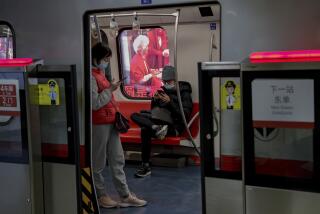U.S., Chinese Doctors Get Internet Link
XIAN, China â Amid summit tensions over Beijingâs policies and practices on human rights, two members of President Clintonâs Cabinet on Friday helped to inaugurate an Internet service that will not only link the American and Chinese medical communities but also will serve as a new gateway to free speech for the Chinese.
The brainchild of Bridge to Asia, a San Francisco-based nonprofit information provider, and developed by Sun Microsystems, a Silicon Valley company, the service lets doctors in China discuss emergency or routine cases with their American counterparts over an Internet link with pictures and sound.
Secretary of State Madeleine Albright and Commerce Secretary Bill Daley formally inaugurated the service, which Friday linked pediatricians at the Xian Medical University in Central China with their peers at the Lucile Salter Packard Childrenâs Hospital at Stanford University. Sponsors said this was the first Sino-American Internet medical teleconference.
The physicians immediately began discussing the case of a 2-week-old in Xian who had slipped into a coma soon after birth.
Jeffrey Smith, Bridge to Asiaâs president, called the China-U.S. link an Internet version of the Wright brothers initial flight, saying: âItâs like Kitty Hawk. Itâs the first awkward flight, but it shows whatâs possible.â
While praising the service as an example of how the two countries can turn technology to their advantage, Albright and Daley alluded to its broader implications.
âIt is a sign of how quickly the newest information technology is coming to China and how far-reaching its effects will be,â Albright said.
U.S. officials have long believed that the opening of Chinese society to the Information Age will push this country in the direction of social change and democracy, just as these forces did a decade ago in Eastern Europe.
The U.S. officials noted that Fridayâs technology display carried important political implications for the Chinese leadership and its steadily diminishing ability to control the flow of information or curtail free speech.
The Chinese already have gotten a taste of this with faxes flying in and out of the country with information after the 1989 Tiananmen Square crackdown.
As for Internet control, âyou can try to shut down a few Web sites, and the Chinese certainly do that, but this is a trend that the Chinese government cannot stop,â said Arthur Kobler, president of AT&T; China Inc.
While the Chinese government moved to shut down some Web sites in China during the Clinton visit--including that of the U.S. based Human Rights Watch group--the Internet is impossible to control completely.
Ironically, the same Chinese government that has moved to curtail dissident activities since Clintonâs arrival also is expanding its information technology network at a breathtaking pace.
Kobler noted that China is adding switching capacity at a rate of 15 million lines per year.
More to Read
Sign up for Essential California
The most important California stories and recommendations in your inbox every morning.
You may occasionally receive promotional content from the Los Angeles Times.








